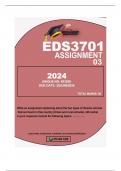, EDS3701 Assignment 03
Due date: 28 June 2024
Number: 693268
Write an assignment explaining about the two types of diverse schools that are found in this
country (Urban and rural schools). (40 marks)
In your response include the following topics:
Education is a fundamental human right and a key to social and economic development. In South
Africa, the education system is comprised of diverse schools, including urban and rural schools.
These schools differ significantly in terms of infrastructure, resources, student population, and
educational outcomes. This assignment aims to provide a comprehensive analysis of urban and rural
schools in South Africa, with a focus on their differences, challenges, and opportunities for
improvement.
Urban schools in South Africa are typically located in densely populated areas such as cities and
towns. These schools are characterized by larger student populations, diverse student
demographics, and access to a wider range of educational resources. Urban schools often have
better infrastructure, including modern classrooms, libraries, science laboratories, and sports
facilities. They also have a higher concentration of qualified teachers and access to technology, such
as computers and internet connectivity.
The demographic makeup of urban schools is diverse, with students from various socioeconomic
backgrounds, ethnicities, and cultures. This diversity presents both opportunities and challenges for
urban schools. On one hand, it allows for greater exposure to different perspectives and
experiences, fostering a rich learning environment. On the other hand, it also poses challenges in
terms of managing cultural differences, addressing inequality, and ensuring equitable access to
quality education for all students.
Rural schools in South Africa are situated in remote, less densely populated areas, often
characterized by limited access to infrastructure and resources. These schools typically have smaller
student populations, predominantly composed of students from disadvantaged backgrounds, and
are often faced with a lack of qualified teachers, limited access to educational materials, and
inadequate infrastructure.
Rural schools face unique challenges due to their geographical isolation, including limited access to
transportation, basic amenities, and healthcare services. The lack of infrastructure, such as
electricity and running water, further compounds the difficulties faced by rural schools. Despite
these challenges, rural schools play a crucial role in providing education to marginalized
communities and preserving cultural heritage.
Both urban and rural schools in South Africa face common challenges, particularly in relation to the
quality of education. These challenges include overcrowded classrooms, a shortage of qualified
teachers, inadequate funding, and disparities in educational outcomes. Additionally, issues such as
violence, drug abuse, and gang activity can also impact the learning environment in urban schools,
while rural schools often grapple with issues related to poverty, malnutrition, and lack of access to
basic amenities.




